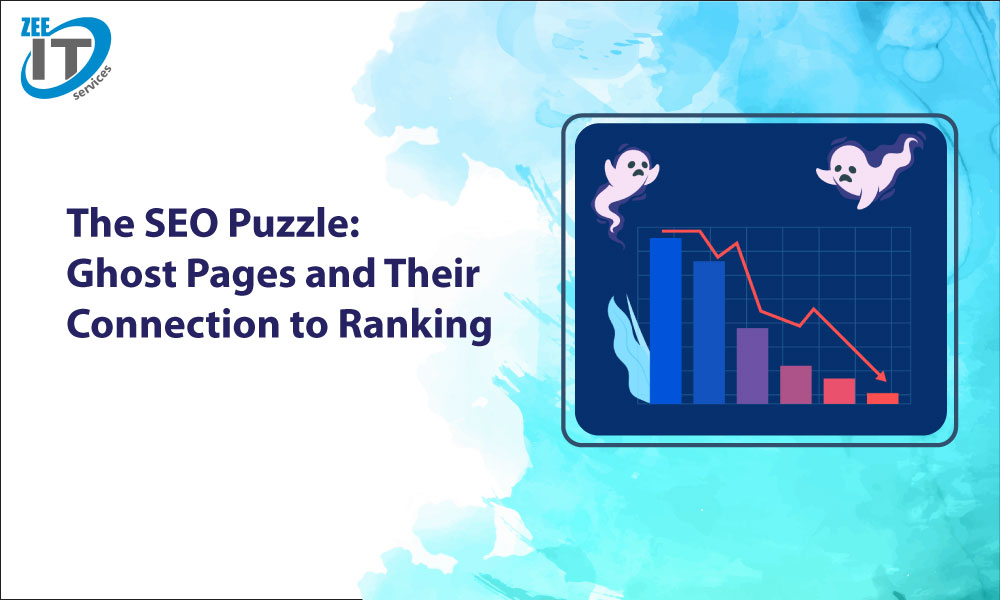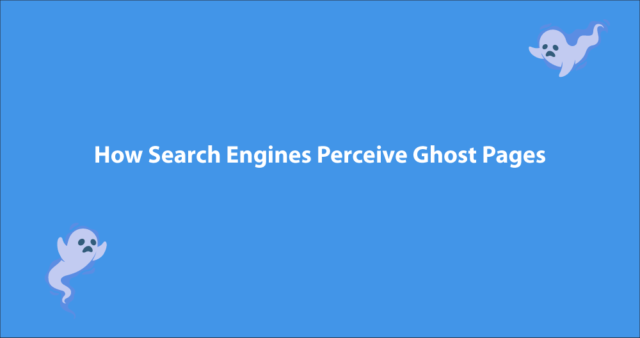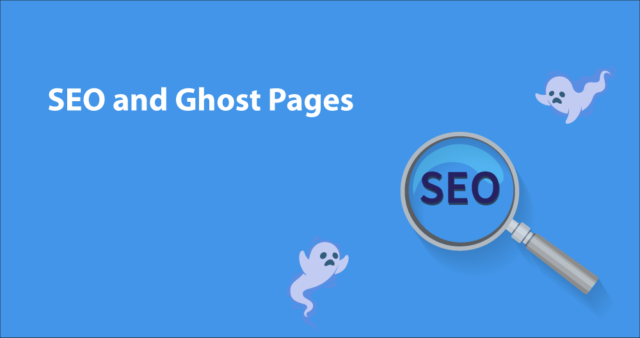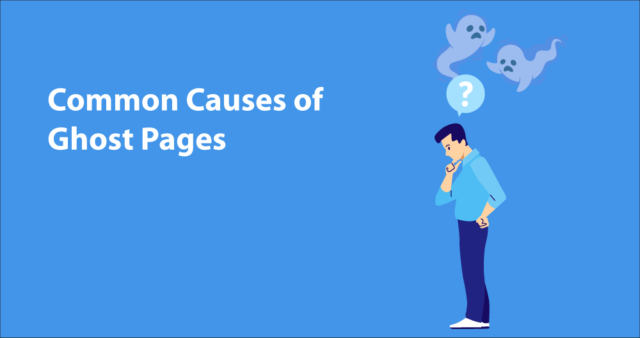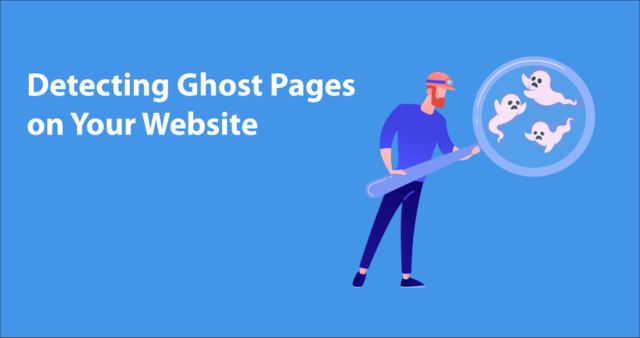What Are Ghost Pages?
Ghost Pages, frequently hidden in mystery, are pages that exist within the framework of your website but remain unnoticed by search engine crawlers. These Invisible issues can undermine your SEO efforts by avoiding detection, thereby missing out on potential opportunities to boost your website’s visibility.
Consider having a page on your website that’s invisible to your visitors, but not to search engines. Ghost Page are like the invisible ink of the digital world, existing without being seen. They’re pages that are indexed by search engines but don’t show up when someone visits your site.
For example, if you design a fantastic product page, well crafted with compelling content, but no matter how hard you look, you can’t find it when you navigate your site. That shows that it might be a ghost page.
Different Types of Ghost Pages
Orphan Pages
Orphan pages, like lost souls in the digital abyss, exist without any internal or external links pointing to them. They are disconnected from the website’s structure, making it difficult for search engines to assign them a place in the hierarchy. Addressing orphan pages in SEO is crucial to maintaining a coherent and well-organized website architecture.
Duplicate Content Pages
Ghost pages can also manifest as duplicates, haunting the web with replicated content. Search engines strive to provide unique and valuable content to users; hence, encountering identical pages raises concerns about the site’s credibility. Resolving issues related to duplicate content is vital for a website’s SEO health.
Redirected Pages
Pages that have been redirected, often due to site restructuring or content updates, can become ghostly remnants of their former selves. While redirects are essential for user experience, mishandling them can lead to SEO issues. Ensuring that redirected pages seamlessly integrate into the website’s structure is crucial for maintaining search engine favour.
How Search Engines Perceive Ghost Pages?
Search engines, the internet’s vast knowledge, rely on algorithms to index and rank web pages. Search engines, such as Google, perceive ghost pages as an enigma, a puzzle waiting to be solved. These pages frequently don’t have the same visibility as information that is well-linked, which begs the question of their relevancy and intent.
While invisible to users, these pages are not invisible to the algorithms, leading to a digital paradox. Additionally, search engines interpret Ghost Page as present and also absent, causing a state of confusion that complicates their understanding of the content on a website.
How Ghost Pages Affect Search Engine Crawlers?
Search engine crawlers, the digital spiders that tirelessly navigate the vast web, encounter ghost pages as Potential challenges in their journey. The absence of clear pathways to these pages leaves crawlers Puzzled, questioning their role in the grand scheme of the website. This confusion can hinder the overall indexing and ranking process.
Indexing Challenges with Ghost Pages
One of the primary challenges posed by ghost pages is related to website indexing issues. Search engines rely on an organized index to serve relevant results to users. While these pages may be indexed, their invisibility to users raises questions about the accuracy of search engine indexes and introduces an element of disorder that search algorithms find hard to recognize. It also affects the relevancy of search engine results when search engines struggle to differentiate between visible and invisible content.
SEO and ghost pages
What Are Ghost Pages in SEO ?
SEO between websites and search engines takes an unexpected turn when Ghost Page make an appearance. Ghost Pages, in the context of SEO, refer to pages within a website that exist in its architecture but go unnoticed by search engine crawlers. These hidden entities can exert a subtle yet substantial impact on a website’s overall performance in search engine rankings.
The Significance of Ghost Pages in SEO
The significance of Ghost Pages lies in their ability to compromise the integrity of a website’s SEO strategy. Search engines, such as Google, prioritize relevance and user experience. Ghost Page provide a level of disturbance that can take attention away from the main content and lower the website’s ranking in search results since they cannot be visited by crawlers.
Imagine having a Ghost Page with outdated content. Search engines may still consider it relevant, affecting your site’s credibility and user satisfaction.
What are Ghost Links?
Now, let’s explore the strange world of Ghost Links as links play a crucial role in SEO. Ghost Links, in essence, are links that exist within a website’s structure but operate incognito and remain undetected by search engines. They may lead to pages that are not indexed or intentionally hidden. Understanding the nature of these invisible connections is crucial for mastering the intricacies of SEO. The question arises here: How do these Ghost Links impact SEO?
Indeed, ghost links have an indirect impact on SEO. When these invisible links connect to Ghost Pages, they contribute to the overall reduction of a website’s content relevance. As search engines analyse link structures and user engagement, the presence of Ghost Links can disrupt the seamless flow of information, impacting the website’s perceived authority.
How to Leverage Ghost Links for SEO Advantage?
To extract value from Ghost Links, consider implementing strategic redirects to channel traffic from these links to high-priority pages. Additionally, audit and optimize these links to align with your SEO strategy, ensuring they contribute positively to the overall user journey.
Common Causes of Ghost Pages
Unintended URL Variations
One prevalent cause of Ghost Pages stems from unintended URL variations, often introduced by URL parameters. These variations can create duplicate content issues, confusing search engine crawlers and diluting the relevance of your primary pages.
But how to Deal with URL Parameters to prevent ghost pages?
To tackle the risk of Ghost Pages appearing by URL parameters, implement proper handling mechanisms. Utilize tools like Google Search Console to specify parameters that should be ignored, preventing unnecessary indexing of variant URLs.
Addressing URL Canonicalization
URL canonicalization issues can contribute significantly to the manifestation of Ghost Pages. When search engines encounter multiple URLs pointing to similar content, it raises questions about the preferred version, leading to content dilution.
To address the URL Canonicalization use the Canonical Tags
To address URL canonicalization issues, leverage canonical tags. Clearly define the canonical version of a page, guiding search engines to prioritize it over its variants. This strategic implementation enhances the focus on core content, minimizing the risk of Ghost Pages.
Content Management System Issues
Content Management Systems (CMS) are powerful tools, but their dynamic nature can inadvertently generate Ghost Pages. These may arise from automated processes, such as pagination or category filters, creating additional URLs that go unnoticed.
How to Identify and Eliminate CMS-generated Ghost Pages
To combat CMS-generated Ghost Page, conduct regular audits. Scrutinize automated processes and ensure they align with SEO best practices. Implement measures like 301 redirects or canonical tags to consolidate authority and thwart the emergence of unintended pages.
Detecting Ghost Pages on Your Website:
It is very important to detect and remove these ghost pages from your site to better maintain its ranking in search engine results. To identify and remove the ghost page we take different advanced techniques using SEO auditing tools and manual inspection. Let’s see how:
Utilizing SEO Auditing Tools
In the arsenal of a meticulous website administrator, SEO auditing tools stand as the first line of defence. These tools not only carefully examine the visible aspects but also penetrate the depths of your website to expose ghost pages lurking in the shadows. These tools included:
Google Search Console
Google Search Console, a stalwart in the realm of SEO, offers an intuitive platform for monitoring your website’s performance. Navigate to the ‘Coverage’ report to unveil any anomalies. Pay close attention to the ‘Excluded’ pages, as these could be potential ghost pages flying under the radar.
SEMrush
SEMrush, a powerhouse in SEO analytics, goes beyond the basics. Utilize the ‘Site Audit’ feature to identify pages with low organic traffic or those that are not indexed. These could be the elusive ghost pages plaguing your website.
Ahrefs
Ahrefs, renowned for its backlink analysis, also provides robust site auditing capabilities. Dive into the ‘Site Audit’ section, where issues like 404 errors or duplicate content may reveal the presence of ghost pages haunting your website.
Step-by-Step Guide to Identifying Ghost Pages
Conducting a Thorough Site Audit
Initiate a comprehensive Audit using your chosen SEO auditing tool. Look for pages with abnormal metrics, such as zero traffic or unusual redirects. These might be ghost page waiting to be uncovered.
Scrutinizing Meta Tags and Descriptions
Ghost pages often wrap themselves with inconspicuous meta tags. Scrutinize the meta information of each page, focusing on those with unexpected or irrelevant content. This meticulous analysis can unveil hidden pages playing ghostly tricks on your SEO.
Manual Inspection Techniques
Analyzing Site Architecture
- Hierarchical Review: Begin with a hierarchical review of your website’s architecture. Ghost pages may linger in forgotten corners. Look for anomalies in your sitemap, ensuring that every listed page serves a legitimate purpose. If a page seems out of place, it could be a ghost page haunting your website’s structure.
- Content Discrepancies: Ghost page often mimic existing content. Conduct a meticulous comparison of your website’s live content against its architecture. Any discrepancies could signal the presence of ghost page that need to be exorcised.
Examining Server Logs for Ghost Page Activity
- Log File Analysis: Your server logs are a goldmine of information. Dive into the log files to identify unusual patterns or requests. Ghost pages may leave limited hints in these logs, betraying their presence even when they remain hidden from traditional scrutiny.
- IP Address Anomalies: Ghost page may be accessed through unusual IP addresses. Analyse your server logs for IP addresses that deviate from the norm. This method can be a powerful manual tool for pinpointing ghost page that automated audits might miss.
Fixing Ghost Pages for Improved SEO
Implementing 301 Redirects
Redirect Strategies for Different Ghost Page Types
- Page Deletion Redirects: When eliminating a page due to outdated content or strategic changes, a 301 redirect is your ally. Ensure that users and search engines seamlessly transition to the most relevant content, preventing any negative impact on your SEO ranking.
- URL Restructuring Redirects: If you’re restructuring your website or altering URL formats, implement 301 redirects to guide both users and search engines to the updated pages. This strategy preserves valuable link equity and maintains a consistent user experience.
- HTTP to HTTPS Redirects: In the era of heightened security, migrating from HTTP to HTTPS is not just recommended—it’s imperative. Implementing a 301 redirect from HTTP to HTTPS ensures a secure and uninterrupted user journey, while search engines appreciate the enhanced security, positively impacting your SEO.
Best Practices for 301 Redirects
- Timely Implementation: Time is of the essence when dealing with ghost pages. Implement 301 redirects promptly to minimize any negative impact on user experience and SEO rankings. Delayed redirects can lead to user frustration and potential ranking penalties.
- Maintain Relevance: Redirecting users to relevant content is paramount. Craft redirects that align with the user’s intent and the thematic relevance of the original ghost page. This not only satisfies user expectations but also signals to search engines that your content is consistently valuable.
- Update Internal Links: Don’t forget to update internal links throughout your website. Ensure that all references to the redirected ghost pages now point to the new, relevant content. This internal coherence contributes to a seamless user experience and reinforces your site’s credibility.
Proper URL Canonicalization
Canonical Tags: How and When to Use Them
- Identifying Duplicate Content: Ghost pages often manifest as duplicates, diluting the effectiveness of your SEO efforts. Canonical tags come to the rescue by signalling to search engines which version of the page is the preferred or canonical one. Implement these tags judiciously to consolidate ranking signals.
- Dynamic URL Canonicalization: For websites with dynamic content, canonical tags provide a dynamic solution. Employ them to steer search engines toward the original, canonical version of a page, preventing the website indexing issues of multiple URLs with similar content. This strategic canonicalization strengthens your SEO foundation.
Resolving Duplicate Content Issues with Canonicalization
- Prioritize Canonical URLs: Clearly define canonical URLs for your pages, prioritizing the most relevant and authoritative version. This ensures that search engines focus on the preferred content, consolidating ranking signals and mitigating the impact of ghost pages on your SEO.
- Regular Audits and Updates: The digital landscape is dynamic, and so should be your approach to canonicalization. Conduct regular audits to identify any emerging duplicate content issues and promptly update canonical tags. This proactive approach safeguards your SEO against the spectral presence of ghost pages.
Why to choose Zee IT Services?
Elevate your online presence with Zee IT Services – your local SEO superheroes! Start your business visibility, outrank competitors, and dominate local searches effortlessly. Our tailored strategies ensure your brand shines in every local search query, bringing customers to your doorstep. Harness the power of local SEO with Zee IT Services – because being found locally is the first step to global success!
Frequently Asked Questions
What are ghost pages in terms of SEO, and how do they impact website ranking?
Ghost pages refer to web pages that are technically present but inaccessible to search engines. These pages can negatively impact your website’s ranking because search engines may interpret them as low-quality content or even penalize them for indexing issues. It’s crucial to identify and address ghost pages to ensure a healthy and optimized website structure.
How can I discover if my website has ghost pages affecting its SEO performance?
Conducting a thorough website SEO audit is the key to uncovering ghost pages. Utilize SEO tools to crawl your site and identify pages with issues like broken links, improper redirects, or blocked access. Analysing your website’s indexation status in search engine consoles can also reveal the presence of ghost pages that need attention.
Do all ghost pages have a negative impact on SEO, or are there exceptions?
While the majority of ghost pages are detrimental to SEO, there might be cases where certain pages are intentionally kept hidden from search engines, such as thank-you pages after form submissions. However, it’s crucial to properly manage and communicate with search engines about such exceptions to prevent any negative consequences on overall website ranking.
How can I efficiently remove or address ghost pages to improve SEO performance?
To tackle ghost pages, start by fixing any technical issues that prevent search engines from accessing these pages. Use proper redirects or update links to ensure accessibility. Regularly update your sitemap and robots.txt files, and communicate changes to search engine consoles. Additionally, monitoring your website’s performance post-correction is essential to track improvements in SEO ranking.
Are there preventive measures to avoid the creation of ghost pages in the first place?
Yes, proactive measures can prevent the emergence of ghost pages. Regularly update and review your website’s content management system (CMS) to ensure it aligns with SEO best practices. Implement proper redirects when restructuring your site, and use canonical tags to indicate preferred URLs. Conduct routine audits to catch and address potential issues before they escalate into ghost pages affecting your SEO performance.

